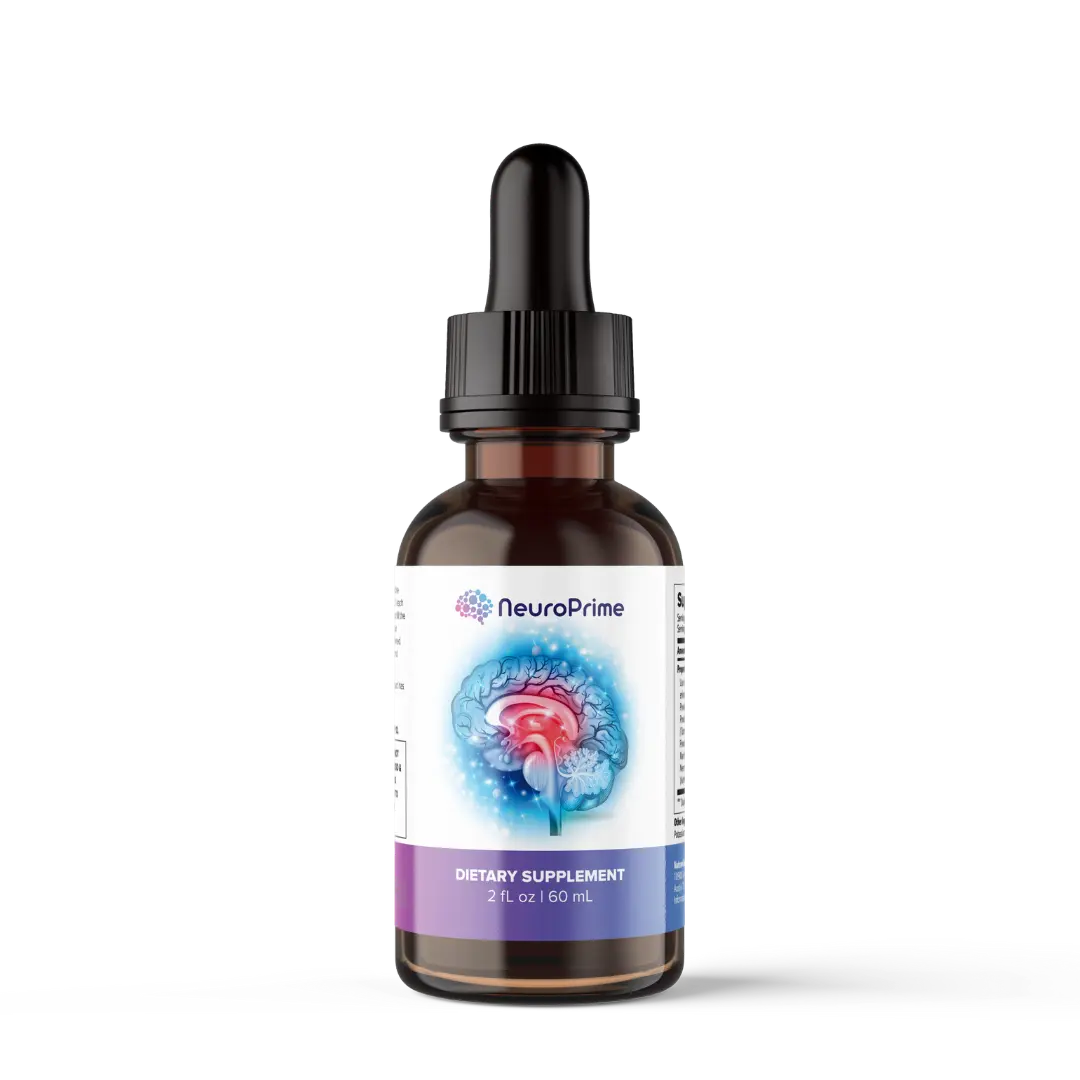



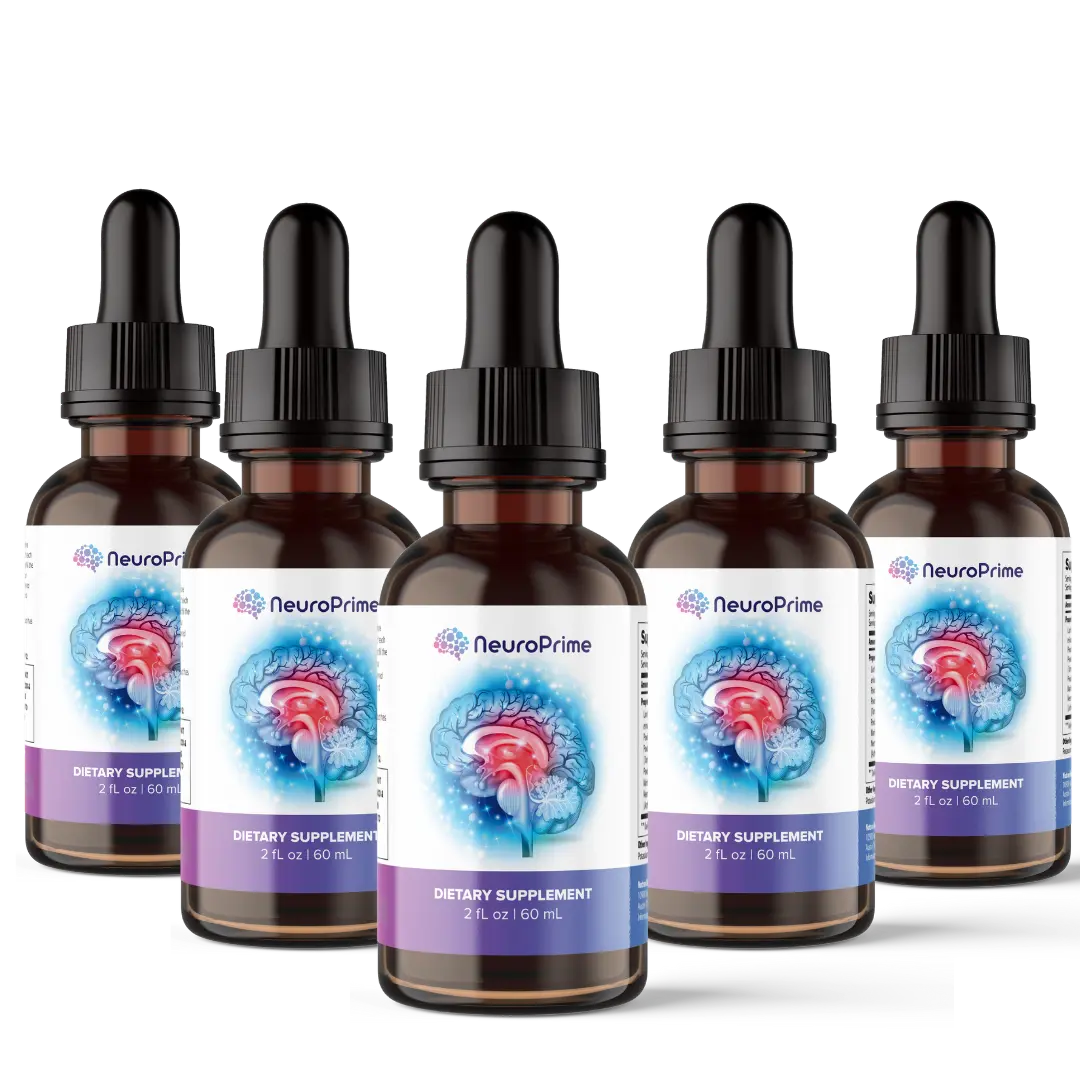


$594 $234


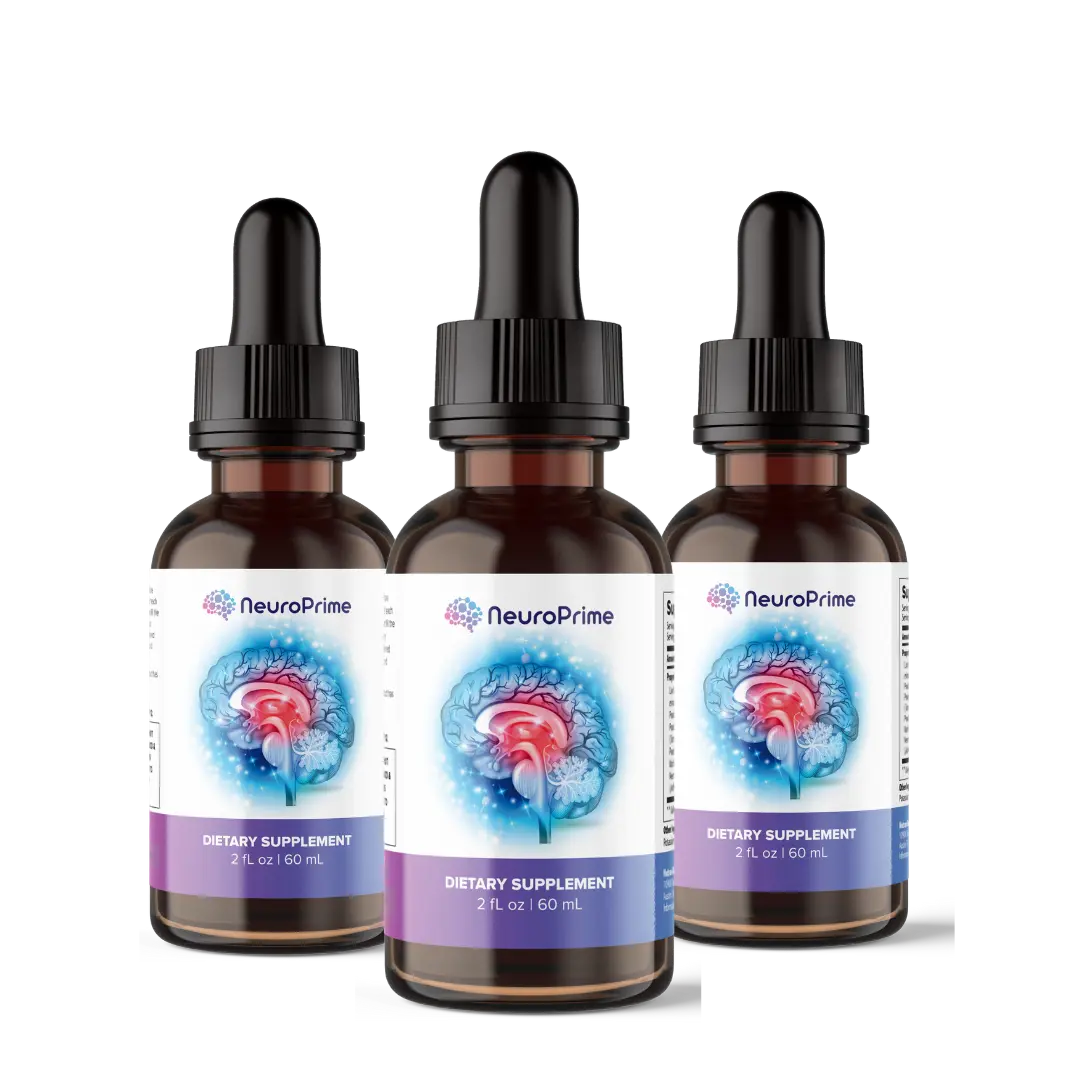



Rogue Military Neurosurgeon Leaks



Maybe you find yourself having those ‘blank moments’, not knowing where you left your keys or why you walked into a room.
And you’ve been worrying, thinking this might be the start of something serious…
Something that could rob you of your memories, keeping you worried about ending up in a nursing home, or forgotten by your loved ones.
Maybe you’ve already seen the doctors hoping for a relief…

And now you’re here because deep down, you know you can’t keep living like this.
You know deep down that the “senior moments” you’re experiencing might be the start of something more serious.
Which means right now, you’ve got a problem.
And you don’t have a solution.
But as you’ll see in a moment, you’ll be shocked to discover that the doctors and billion dollar health industry have LIED to you.
Telling you there’s no solution to the memory lapses that are slowly taking over your life.
And as you sit there reading this, they are making billions off of you, off of your suffering because…

They keep selling you expensive brain-boosting supplements, memory therapy sessions, and drugs with severe side effects.
Without ever revealing the inexpensive and natural Memory Revival Tonic that you can use right now to reclaim your mind and feel completely NORMAL again.
In a moment I’ll share with you the studies from Harvard and Stanford revealing that these ‘senior moments’ are a symptom of a much more serious underlying condition that most doctors FAIL to recognize.
And if you ignore these signs, Harvard scientists are saying you could be on your way to developing chronic brain damage, severe cognitive decline, or even full-blown dementia...
Erasing your entire memory, making you unable to remember your loved ones, or even yourself.
I’ll show you the studies from Stanford showing that your memory problems aren’t caused by your genetics, aging or anything else...
But as scary as that sounds, know that there’s hope…
Because a former Army Neurosurgeon broke his silence and revealed a 3-second “Memory Revival Tonic” that neutralizes this toxic mineral from your brain and allows you to keep your memory strong well into your 80s and 90s.
This 3-second “Memory Revival Tonic” has been once only reserved for military officials and Special Ops to fight memory loss.

But starting today, you can get access to it and use it to clear the fog from your mind, once and for all.
This natural solution is so powerful that it has already been clinically proven to work for anyone, regardless of their age or the severity of their memory issues.
So, even if you’ve lost hope in the medical system, and even if you’ve tried everything without success, it’s important you stay with me until the end of this report.
Because in just a few moments, you’ll discover how to stop feeling like you’re losing your mind and take back control over your life.
You’ll start remembering names, dates, and important tasks as effortlessly as you did in your 20s.
You’ll wake up with a razor-sharp mind, effortlessly recalling your thoughts and conversations from the day before.
No more confusion clouding your days, no more anxiety over forgotten details, and no more pretending during conversations.

You’ll no longer fear losing your mind or ending up in a nursing home, forgotten by your loved ones.
Simply put, once you start using this natural and inexpensive Memory Revival Tonic, memory loss won’t be a part of your life anymore.
You’ll put a stop to any brain damage that might have already started to develop, all while protecting your memories, sanity, and health for years to come.


Like James D. from Florida, who said:
“I was worried about ending up in a nursing home because of my memory loss. This tonic has given me hope. I feel sharper and more focused than I have in years. My family has noticed the difference too, and we're all so grateful.”

And Susan O. from Chicago, who shared:
“My memory issues were getting so bad that I was afraid to leave the house. I kept forgetting names and faces, which was so embarrassing. This tonic has been a game-changer. Now I can remember names and faces, and I no longer feel embarrassed in social situations. I even started going to my book club again, and everyone was amazed at how much more engaged I am. It’s like I’ve got my life back, and I can’t thank you enough.”
Now, before we continue, there's something I need to tell you...
I've been receiving threats from the big pharmaceutical companies because they don't want the public to know about this natural memory-revitalizing tonic.
So, I don't know how much longer I can keep this website up and running.
I urge you to remove any distractions around you and pay close attention until the very end of this report…
Because what I’m about to share with you can literally change your life or your loved ones' lives forever.
For the past 30 years, I’ve served as a professor at one of the most prestigious universities in the country.
However I’m not here today to overwhelm you with scientific jargon.
Instead, I want to share with you one heart-breaking event that led me to discover a the natural “Memory Revival Tonic” that restored my wife’s sharp mind and vibrant life.

Linda, my wife, used to be the one who remembered every little detail.
She always knew what groceries we needed, the dates of family birthdays and anniversaries, and even when bills were due.
But as we were approaching our mid-60s, everything began to change for Linda.

It was like watching her fade away right before my eyes.
At first, it was little stuff, like forgetting why she walked into a room or where she put her keys.
We joked about it at first, blaming it on ‘brain farts’ or too much on her mind.
But then Linda’s memory slips became frequent.
She’d repeat herself twice or forget a story she had just told five minutes ago.
Sometimes she’d spend the entire morning looking for her glasses, only to find them in the fridge or in the trash can.
Man, it got rough.
Bills were forgotten, we’d end up with doubles of everything from the store.
As the days went by, I started to get worried.
But Linda kept insisting she was fine, denying anything was wrong.
That morning, our daughter stopped by and dropped my grandson before she headed out of town for work.
I was at the local farmer's market picking up ingredients for dinner when my phone rang…
It was our neighbor, her voice shaking as she said,
“James, there's smoke coming from your house. It looks serious.”

My heart dropped.
I called Linda multiple times, but she wasn’t picking up the phone.
Worried sick, I raced home as fast as I could.
When I finally got to our street, I saw smoke pouring out of our house.
The door was unlocked.
The smoke was thick and I could barely see..
I found him on the ground, his little face red and coughing, struggling for air.
I scooped him up and ran outside just in time as the firefighters arrived.
We rushed him to the hospital, where they treated him for smoke inhalation.
Meanwhile, we found Linda sitting on a bench at the local park, completely unaware of the smoke filling our home and the chaos it was causing.


It turned out she had forgotten the stove was on and had wandered off, unable to remember why she had even left the house.
That day left us shaken and traumatised.
It wasn't just forgotten names or misplaced keys anymore.
It was a matter of life and death.
In the weeks after the fire…
Linda was diagnosed with early-stage Alzheimer's.
We spent a big part of our savings seeing one doctor after another.
We saw all kinds of specialists, neurologists, geriatricians, you name it…
But we kept hearing the same frustrating message:
At each appointment, they’d prescribe Linda new medications.
They handed out Aricept and Lecanmab…
But even with all these pills stacking up on our kitchen counter, Linda’s condition just kept getting worse.
It felt like the medications Linda was on were doing more harm than good…

The situation got worse when she started hallucinating, couldn’t sleep, and had severe diarrhea.
Then one day, she collapsed completely.
We had no choice but to rush her to the hospital.
When she woke up, Linda was completely disoriented.
She looked at me in complete shock and said something that shattered me into pieces:

And then out of nowhere, she started screaming: ‘Help, help! He wants to kill me!’
That moment broke my heart.
I knew this illness was taking my wife's mind and tearing our family apart.
I couldn’t just sit still and accept that this decline was just a normal part of aging…
Linda needed more than just a temporary fix… She needed and deserved a real solution before it’s too late.
I found a major study published in the Molecular Neurodegeneration Journal in 2019 where scientists studied people with early memory loss and Alzheimer’s.
What they discovered was shocking.
They found out that each one of these patients had a significant calcification1 in a tiny organ in the brain called the pineal gland.
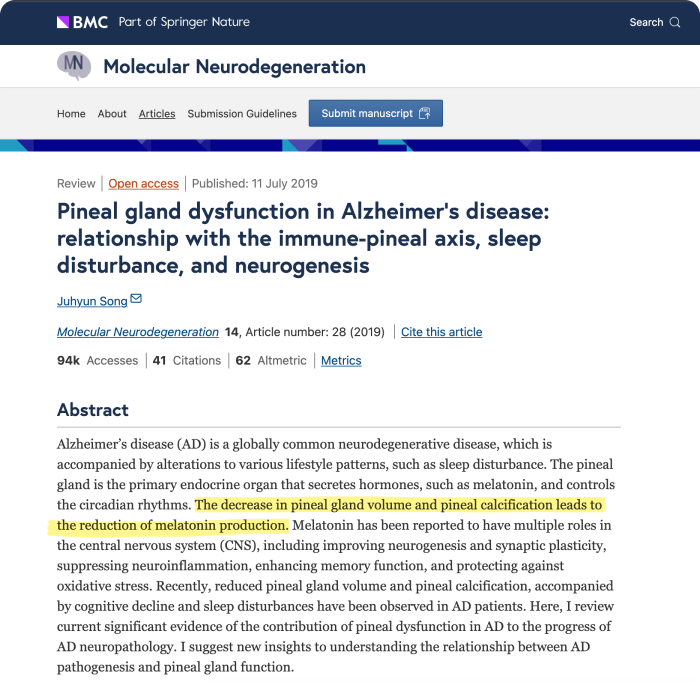
Now, you might be wondering, what is the pineal gland?
And why is it such a big deal when it comes to memory loss?
Let me explain...
The pineal gland is a small organ in the brain that releases an important hormone called melatonin.
Now you might know melatonin as a sleep supplement, but according to a new study published in 2023 from Harvard Medical School, the natural melatonin our pineal gland releases is quite different.
They showed that not only does natural melatonin help regulate sleep but it also acts as “neuroprotector.”2
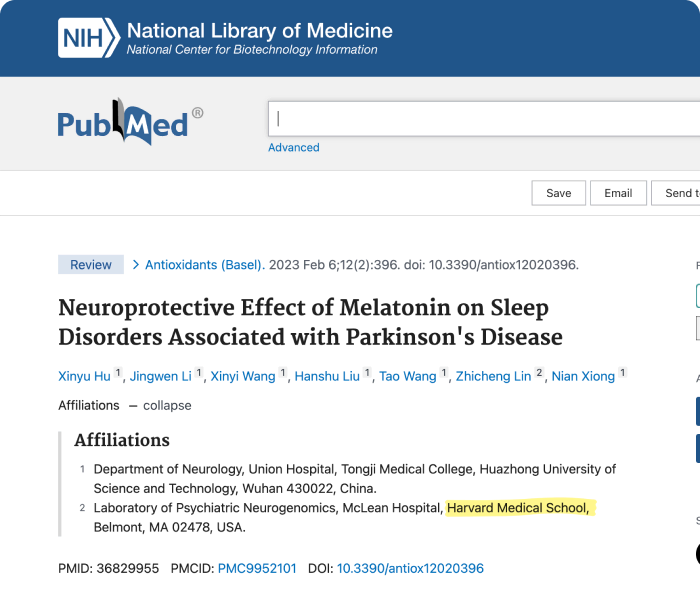
Meaning that when melatonin is released properly from the pineal gland…
Your nervous system can fight inflammation, keep your brain agile, improve memory, and protect against oxidative stress.
The problem is, patients who struggle with cognitive decline have a dysfunctional pineal gland that can’t release melatonin.
Here’s what that means… Imagine your brain as a car.
The pineal gland is like an oil pump, and melatonin is the oil that keeps everything running smoothly.
Stanford scientists confirmed that melatonin “lubricates” the neurons in your brain, making sure they function smoothly and communicate effectively…3
So that when you try to think about where you left your keys, recall a name, or remember important dates, your brain can retrieve the information quickly and accurately.
But here’s the catch…
People with early memory decline, Dementia or Alzheimer's have a calcified pineal gland.
This means there isn’t enough melatonin in the brain to allow neurons to communicate together…
Over time, neurons in the brain start to “rust,” deteriorate, and eventually DIE.
Now why does this happen in the first place?
Well studies show that as we age, the pineal gland produces less and less melatonin over time, especially for people over 60.
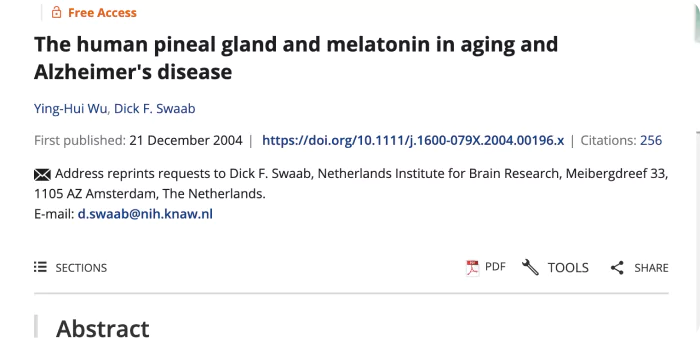
But there’s one other major culprit behind the pineal gland calcification that’s terrifyingly overlooked.
I found a study in the Journal of Environmental Health showing that the pineal gland is especially vulnerable to a toxic mineral called Fluoride.
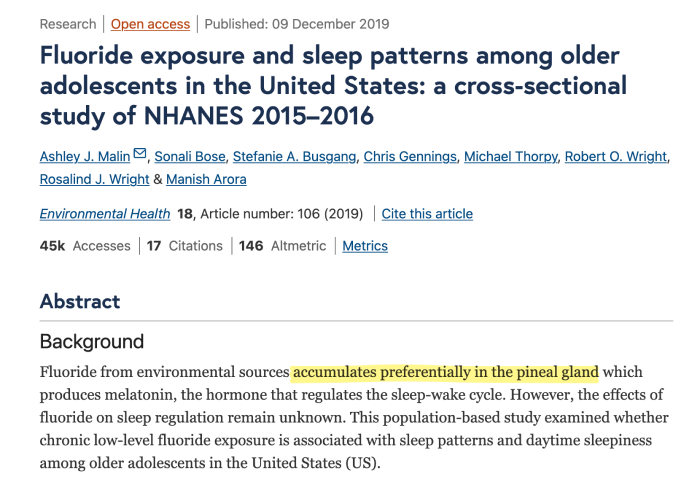
Fluoride is everywhere: in the water we drink, the food we eat (especially canned food, wine, seafood, potato, grapes), and even in toothpaste.
Now I always thought the dangers of fluoride were just conspiracy theories.
However, it turns out that Harvard scientists confirmed fluoride is highly neurotoxic, meaning it kills neurons in the brain, the same ones that keep your memory sharp.5
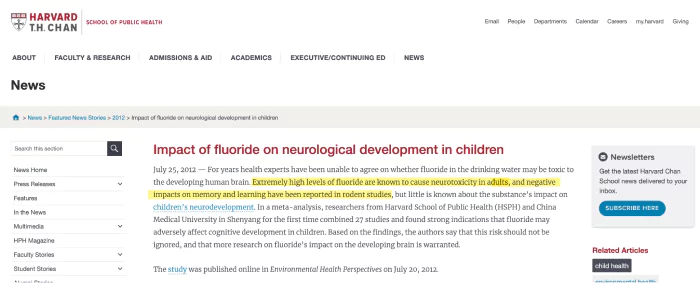
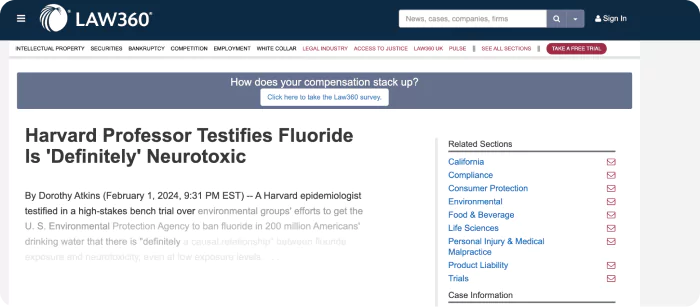
The pineal gland is like a magnet to this toxic mineral…
Over the years, every time you brush your teeth, drink tap water, eat food that contain fluoride, this toxic mineral enters your bloodstream and builds up around your pineal gland.
It acts like sludge that clogs the oil pump until it becomes calcified and can no longer release melatonin.
Here’s how it starts to look:
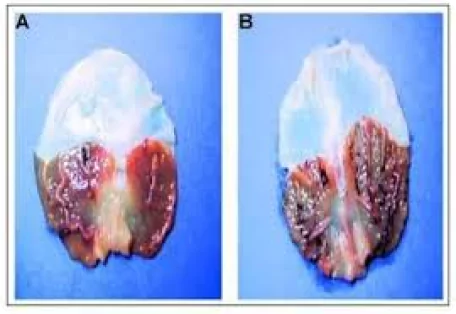
Without this essential oil (melatonin), the car (your brain) starts to break down.
Neurons don’t fire properly, they start slowly disconnecting and unable to send signals to each others until they completely DIE.

And the sad part is, most people ignore early signs of memory loss until their brain completely shuts down.
Each day you wait, the more fluoride coats your pineal gland and shrinking its size and leads to neurodegenerative diseases like Alzheimer’s, Dementia or Parkinson’s.
Here’s a simple test to know if you’re at risk of developing Alzheimer’s or Dementia…
Think about a scene from a movie or TV show you watched a while ago.
Can you remember what the main character was wearing?
Or think about the last time you walked back from the grocery store?
If you struggle with remembering one of these simple things, know that this could be the start of something more dangerous that can rob you of your memories.
Sadly, every day this keeps on going, your brain keeps on fighting hard to keep itself working…
Causing your brain neurons to disconnect and die prematurely, erasing your memories, cherished moments, and even making you forget who you are until you lose your mind.

Most doctors don't routinely check for pineal gland calcification, so this goes unnoticed for many struggling with early memory loss.
The good news is, I finally understood the root cause of the problem, the next step was for me to find a solution to save my wife.
I wasn’t going to ignore what I discovered and wait for some brain disease to take her life away.
Now, we tried giving Linda melatonin supplements, but we discovered that most melatonin on the market is either derived from animal pineal glands or made in a lab.
It doesn’t address the real issue of fluoride calcifying the pineal gland in the first place…
It also can’t restore the natural production and regulation of melatonin that our body needs.
Often, if taken at the wrong times, it can disrupt your circadian rhythm, as each body has its own unique cycle, leading to sleep problems and making the problem even worse.
Which is why for the next few weeks, I started emailing every researcher, doctor, medical expert & scientist with my findings.

Now, because what I’m about to share with you could potentially get him in trouble, let’s just call him Doctor X.
He’s a Former Military Neurosurgeon and one of the brightest minds the US Army has ever seen.
In the past, he used to come to our University and do talks about new medical discoveries.

A genius-level doctor who spent several years performing complicated brain surgeries and treating patients all over the US as well as in countries like Germany, Switzerland & France.
I made an appointment with Dr. X, hoping he could help with Linda’s cognitive decline.
He insisted, however, that we meet at his house instead of his practice.

When I arrived, I knocked on his door.
He opened and looked around nervously then whispered, "Did anyone follow you?"
“I don’t… believe… so,” I stuttered.
“Just come in,” he said.
Looking back, it was weird, but I felt like he was about to tell me something important.
We sat down in his living room. He then leaned in closer, his eyes serious:
He went on to tell me that while he worked as a Neurosurgeon in the Army.
He saw brave soldiers, once sharp and quick-witted, become forgetful and frustrated as their minds betrayed them.
While some of the memory problems could be from the tough conditions and trauma of service, many cases were confusing.

These soldiers didn't have any physical problems that could explain why they suddenly started forgetting things.
The US Department of Defense couldn’t let this cognitive decline slow down their best.
They needed soldiers with strong minds because, on the battlefield, it could mean the difference between life and death.
He worked alongside the nation’s leading brain surgeons and neurologists to find a solution to these early signs of memory loss.
After doing CT scans, they discovered something shocking…
Almost everyone who had memory problems had significant calcification in the pineal gland.
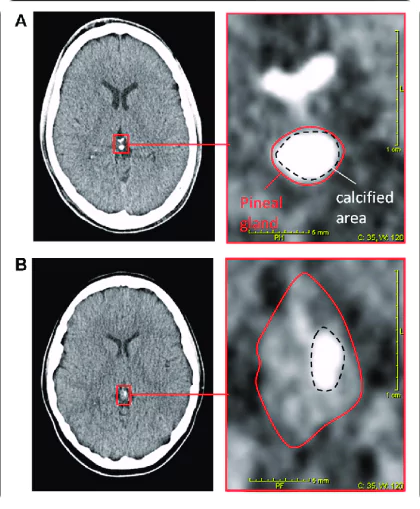
What’s even more shocking is that they traced all of this back to Fluoride.
See… Dr.X shared with me that fluoridated water is mandatory across most military bases.6
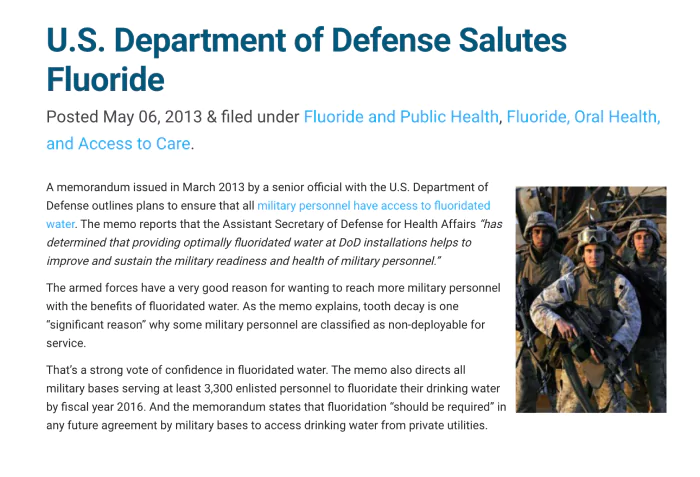
This mineral has been added to the water since 1945 to fight against dental issues.
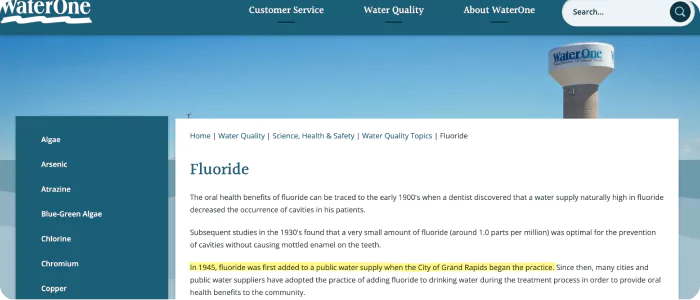
But like any synthetic mineral, fluoride doesn’t go without its side effects.
High-ranking generals and government officials couldn’t just go public and admit their mistake by saying:
“Oh, we made a mistake, we’ve caused memory issues for millions of innocent Americans.”

Instead, the secret experiment Dr. X worked on involved creating a special memory reviving formula reserved for politicians, high-ranking generals, special-ops, government officials, and CEOs…
It’s designed to flush out fluoride from the body and detoxify the pineal gland to release melatonin again.
Hearing Dr. X’s made my blood boil with frustration…
“Are you kidding me? This information is buried away? What about the millions of innocent Americans and veterans suffering daily… many on the brink of giving up?”
Dr. X said everything can be cured except “GREED.”
The government has strong ties with the pharmaceutical industry, mega food companies, and toothpaste manufacturers that benefit from adding fluoride.
“All they care about is MONEY” - Doctor X. whispered
In fact, did you know that BIG PHARMA is worth over $1.42 trillion dollars?
And that the US Military Budget is a staggering $842 billion, all funded by the taxes we hardworking Americans pay.
Yet, only a fraction of that money supports the veterans struggling with cognitive decline.
The secret memory restoration formula they created was kept only accessible to 0.001% of the population.
And if you think about it…


Why would they give up on billions of dollars, when they can keep making a fortune on the backs of struggling, hard working Americans like us.
They had no intention of sharing this formula with the public.
Dr. X felt guilty each time he saw his patients struggling with memory decline and how countless Americans continued to suffer, feeling hopeless and betrayed by the medical system.
This is why he responded to my call in the first place.
He believed regular people just like Linda deserved to know the truth and regain the clarity and sharpness of mind they once had.
That’s when I asked him “Do you still have access to this formula?”
As I expected, it’s a unique combination of natural herbs that only works when mixed in exact proportions at the right time.
When these herbs are combined correctly, they’re proven to treat pineal gland calcification and restore memory in two easy steps
Now, I know you can’t wait to discover what’s inside this unique formula…
So let me share with you what’s inside and how it works so you can use it for yourself or your loved ones to restore memory and bulletproof brain health.
The first ingredients of this military formula were selected to remove the toxic fluoride coating the pineal gland.

He told me that tamarind has been cherished for centuries across various cultures, from Africa to Asia, for its powerful detoxifying properties and health benefits…
And recently, scientists have figured out why this fruit is so effective…
Discovering that it’s all due to its unique and potent antioxidant profile, which is capable of cleansing the body, including the pineal gland.
“Tamarind acts like a magnet, drawing fluoride out of your pineal gland,” said Dr. X.
He told me about a groundbreaking study published in the Journal of Fluoride.
Participants were given a daily dose of tamarind extract.
And after analyzing urine samples when the study concluded, they were ASTOUNDED to see how effectively tamarind eliminated fluoride…
With significant amounts of fluoride being expelled from the body within just 24 hours…7
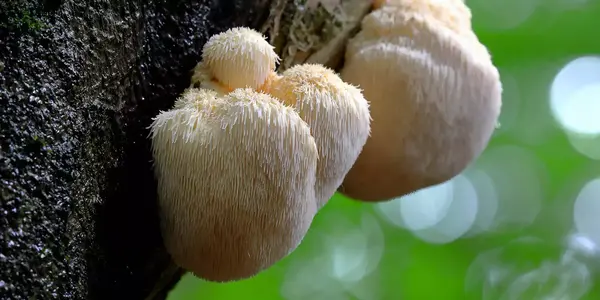
Known in many cultures as the "spiritual mushroom."
He mentioned that in Japan, this mushroom has been a trusted remedy for centuries, renowned for its ability to clear mental fog and improve memory…
Recently, scientists have discovered what makes it so effective…
They found that its powerful antioxidants play a crucial role to detoxify the brain and heal the pineal gland.
Dr. X mentioned a study published in the International Journal of Molecular Sciences.
In this 16-week, placebo-controlled, double-blind clinical trial…
Adults aged 50-80 with mild cognitive impairment were given Lion’s Mane mushroom extract daily or a placebo.
The results were astonishing.
The patients who took Lion’s Mane showed ‘significant’ improvements in memory and daily functioning compared to the placebo group, measured at multiple intervals throughout the study.
Not only that, but Lion’s Mane also helps slow the progression of Alzheimer’s disease…
Scientists at the University of Malaya in Malaysia discovered that Lion’s Mane helps brain cells grow and regenerate, with studies indicating a 60% increase in how neurons connect and communicate with each other.8
Meaning this incredible mushroom was not just improving their current condition but also offering long-term brain health benefits!
But that’s not all…

This plant grows in tropical regions, especially in Africa and India, and is packed with nutrients, vitamins, amino acids, and proteins that are essential for good health…
Recent research showed that Moringa helps improve memory, boost energy, and support the immune system due to its unique combination of nutrients.
It’s also been shown to reduce fluoride levels in the body by up to 60%9.
“Moringa works like a natural filter for your pineal gland,” He said.
Doctor X shared with me a study published in the prestigious medical journal ‘Frontiers in Endocrinology’ in 2022
In this study, participants with early-stage dementia who took Moringa saw a 43% increase in natural melatonin production within just a few weeks…10
They also reported noticeable improvements in their memory recall and cognitive function…11
But we’re not done yet because the second step is…
Now that your pineal gland is cleansed, let’s move on to the next step: activating it to produce and release melatonin again.
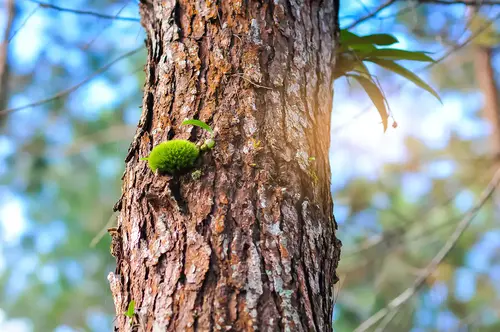
He explained that this extract is derived from the resilient trees along the coast of southwest France…
And that recent research has shown why it’s so effective… Proven to dramatically increase melatonin levels, enhancing sleep quality and cognitive function.
Dr. X told me about a 12-month study conducted at Chieti-Pescara University in Italy.
In this study, participants aged 55-70 were given a daily dose of Pine Bark Extract.
By the end of the study, they showed significant improvements:
Daily decision making improved by 72%
Attention span improved by 41.2%
Memory improved by 37.3%
Ability to deal with people improved by 57%
Ability to manage finances improved by 32%
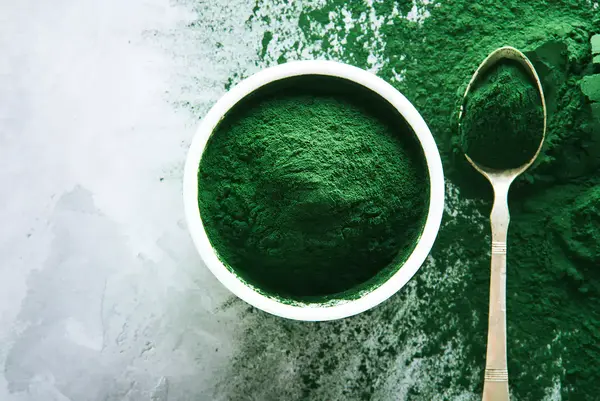
A fascinating blue-green algae that has been cherished for centuries by ancient civilizations like the Aztecs for its exceptional nutritional properties.
This algae contains high levels of chlorophyll, preventing the accumulation of toxins in the brain.
This detoxifying effect protects against cognitive diseases like schizophrenia, Parkinson’s disease, Alzheimer’s, and concussions.12 Plus, Spirulina is packed with antioxidants, particularly phycocyanin, which gives it its unique blue-green color.
These antioxidants help reduce oxidative stress in the brain, protecting brain cells from damage.
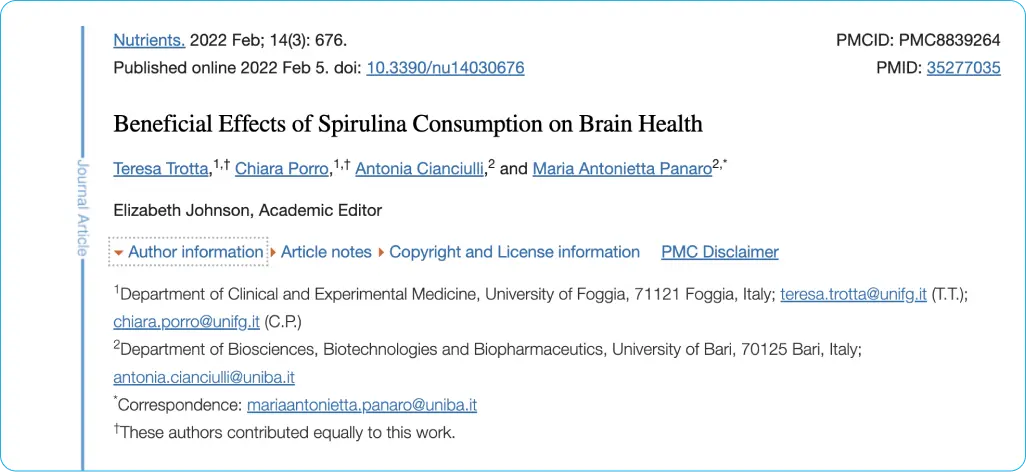
In a study conducted by researchers at the University of Bari in Italy, participants who took Spirulina daily showed significant improvements in memory and cognitive function.
They also experienced increased growth of new brain cells in the hippocampus, the part of the brain responsible for memory.
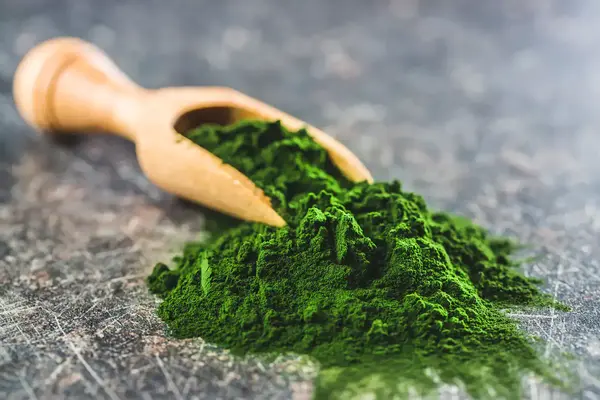
Packed with high levels of antioxidants, vitamins, and minerals.
This particular strain is renowned for its health benefits and is harvested from the clean waters of Okinawa, Japan, to ensure purity and potency.
Recent studies have highlighted its remarkable brain-boosting properties.
Dr. X mentioned a study published in 2023 in the journal ‘Molecules’.

In this study, participants with cognitive decline were given a daily dose of Chlorella.
And after just a few weeks, they showed significant improvements in cognitive function, including better memory recall and reduced oxidative stress.
Plus, their natural melatonin production increased, leading to enhanced sleep quality and overall brain health.
By combining these powerful, natural ingredients, this special formula not only detoxifies the pineal gland but also rejuvenates overall brain health and restores cognitive function quickly.
All I could think about hearing what Dr. X shared with me was whether this could work for my wife.
I asked Dr. X if he had this formula available.
Unfortunately, he said that getting these special ingredients is incredibly difficult. They are rare and often hard to source.
I then thanked Dr. X for his guidance and decided to look for a way to recreate this formula.

I reach out to my friend, Prof. Andrew Hill, who’s the head of our laboratory at the University.
Together, we called in favors and found suppliers across the globe to get the finest, purest ingredients.
It took a few months of effort, but we finally succeeded in acquiring everything we needed.
But we didn't stop there.
During our research, we discovered three more powerful ingredients that enhanced the effectiveness and the absorption of the original mix by 200%.

This incredible plant is renowned for boosting memory and cognitive function by enhancing blood flow to the pineal gland allowing for better release of melatonin in the brain.
It enhances brain function, reduces anxiety, and improves memory and learning.



This unique blend came in a liquid form for maximum efficiency, unlike pills or powders that often cannot be fully absorbed.
And based on all the studies and research we’ve found we knew this would work.
But Linda and I had been let down and disappointed so many times already that I didn't want to get our hopes up.
But what did we have to lose? After all, this formula was 100% natural.
Dr. X said Linda should place one drop under her tongue twice daily…
Once in the morning and once before going to sleep.
Then we’ll track her progress within a month.
She told me the liquid had no smell at all.
And as she dabbed the first dose onto her tongue, she mentioned that it was easy to swallow and had a very light herbal taste.
Which was a relief, since she's always been sensitive to strong flavors.
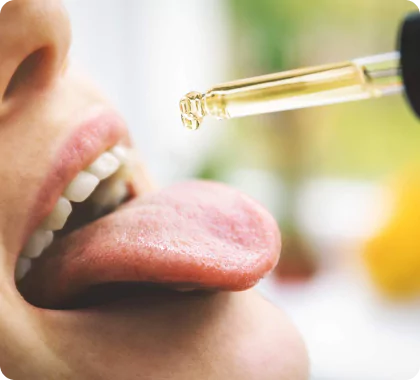
After the first couple of days, I have to admit, Linda didn't seem any different at all.
She still had trouble sleeping through the night and struggled to remember when to take the dropper formula.
Part of me worried that maybe we were wasting our time.

And thank GOD I did.
Around the 7th day, things started to change.
One evening, Linda was flipping through an old photo album and started recalling names and events with such clarity.
She even remembered the name of the restaurant we visited on our first date, something she hadn’t mentioned in years.
It was the first time in months that she’d been able to do that.
A few days later, we were watching a movie, and she began to talk about a trip we took to the Grand Canyon years ago, recalling little details that I had completely forgotten about.

One morning, she even reminded me of an appointment I had forgotten.
Her energy and focus were back, and she seemed so much more at ease.
By Day 30, I was blown away by her progress.
She was lively, focused, and her playful sense of humor had returned.
It was truly unbelievable.
Seeing her transformation was wonderful, but the best part was hearing her say how much more in control she felt.
She enjoyed our time together without any mental strain or frustration.
She was back to being the fun-loving, independent woman I fell in love with years ago.
After seeing Linda’s remarkable improvement, I knew I had to share Dr. X’s groundbreaking discovery with everyone.
So I picked up the phone and called Dr. X.
“She's remembering names, dates, and little details effortlessly. We can't possibly keep this to ourselves. We should make this available to everyone!”
After a few seconds of silence, Dr. X told me that while he’d thought about trying to share his formula with the general public before, he was scared of being attacked by pharmaceutical companies and their billion-dollar lobbyists.

He was convinced that when they found out about his formula, they would do everything in their power to suppress it and attack him in the media.

But even after hearing all this, I couldn’t let it go.
I begged and pleaded with him to reconsider, asking him to be brave and share this discovery because it could change the lives of millions suffering not just from brain fog or little memory lapses, but even Alzheimer's and Dementia, just like it did for my wife.
Finally Dr. X agreed.
However, before sharing it with everyone, we had to make sure this formula worked for everyone struggling with cognitive decline, not just Linda.
So we began reaching out to people in online forums who had shared their personal struggles with memory loss.
We included all types of issues from simple “forgetfulness” to early signs of dementia and Alzheimer's.
Our goal was simply to find volunteers who were willing to try out our discovery.
We ran the experiment for a few weeks and to our amazement…
From the 50 people who volunteered… Every single one of them experienced amazing results!

One woman named Maria S. from Austin, Texas, shared,
"My memory had been deteriorating for years, and it was affecting my confidence and daily life. I couldn't remember names or simple tasks. And I was afraid I’ll end up with my loved ones giving up on me. After using this formula for a month, I noticed a dramatic improvement.I could recall names, dates, and even small details about my day. It has given me back my independence and self-esteem."

Another gentleman named Robert K. from Seattle, Washington, said,
"I've been dealing with memory issues for quite some time. I was skeptical about trying something new, but after using this formula, I saw a significant difference. I can remember my appointments, phone numbers, and even conversations without struggling. My family is thrilled with my progress."

And finally, a woman named Emily T. from Denver, Colorado, shared,
"Since my husband passed away, I've struggled with keeping track of important dates and memories. This liquid has been a lifesaver. My memory has improved, and I feel more connected to my past and my loved ones. It's like I've gotten a part of my life back that I thought was gone forever."
After hearing all these success stories… We knew we created a breakthrough formula.
And we’re so excited to give you the opportunity to join people across the world by giving you the chance to try out this memory reviving tonic for yourself.

With the help of leading neuroscientists, we created NeuroPrime.
It's the only 100% natural formula that tackles the real root cause of your memory loss:
The calcification of the pineal gland caused by toxic fluoride in the body.
We've sourced the purest, 100% natural ingredients and combined them in precise quantities within an easy-to-use liquid drop formula.

NeuroPrime is vegan, non-GMO, and 100% safe.
It does not contain any dangerous stimulants or toxins, and it is not habit-forming.
This is the same ultra-secret formula that was once only available to a select few of people.
Once you add NeuroPrime to you your daily routine…
You'll finally enjoy life without the cloudiness or forgetfulness disrupting your thoughts.
You’ll stop struggling to recall names, dates, or where you left your keys and start thinking clearly and effortlessly.
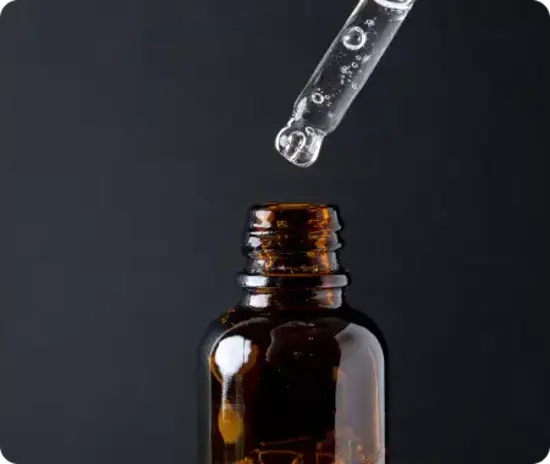
So forget the ineffective supplements, the expensive therapies, the mind-training apps, and the endless doctor visits that only provide temporary relief.
This is the only memory-enhancement liquid drop formula that dissolves the calcification in your pineal gland and gives you the sharpness and clarity you’ve been missing.
Now, as you sit here reading this, you’re probably wondering how you can get your hands on this memory-reviving formula as quickly as possible to start experiencing the benefits firsthand.
Let me be completely honest with you.
We have only a limited supply of NeuroPrime available.
And that’s not a marketing gimmick or anything like that, it’s a fact.
Because NeuroPrime is made using a very complex process:
Which is crucial in creating a 100% natural and effective formula for improving memory and cognitive health.
All of this make the entire process time-consuming and expensive.
Which means we’re often running out of stock.

And because we can only produce a limited number of bottles at a given time.
We also had some people use it for more than just improving their memory.
People all over the world are using it to get rid of brain fog and to skyrocket their energy, while also protecting themselves against cognitive decline and brain damage.
So people order several bottles at a time, so they can stay stocked up.

I’m excited that we could help so many people regain their mental clarity and happiness.
But the popularity of this formula has put even more of a strain on our production capacities.
With that being said, however, I don’t want memory problems to ruin your life like it did to so many others.
I don’t want anyone struggling right now to develop more serious conditions when there is a simple solution.
Which is why since you’ve followed this presentation so far, I’m going to share how you can get your hands on NeuroPrime today for much less than you may think.
See, if you would try to recreate this blend with the super natural ingredients that are inside NeuroPrime, you would spend upwards of $3000 to source all those ingredients from all over the world.
Only to end up with a small batch that won’t be nearly as effective.
So the price is not going to be anywhere $3000, nor is it even half of that at $1500.
I want you to just think about this for a second.
What would you pay to flip a switch and turn off the forgetfulness, the confusion, and the mental fog once and for all?
What would it be worth to you to not think about ending up in a nursing home where your loved ones forget about you?
What would it be worth to you to claim your memory back, feel like yourself again and protect your brain from developing serious conditions that could cost you your independence or even worse, your life?


Here’s what you won’t pay.
You won’t pay anything near what anyone else charges for expensive and ineffective drugs…
You won’t pay anything near useless memory therapies that may not even work.
You won’t pay anything near to what it costs for multiple visits at the neurologist.
You see, while NeuroPrime has a suggested retail price of $149 (which is an absolute steal in its own right)…
But on this website only…
You’ll be able to get your hands on a full six-month supply for just $39 per bottle…
And on top of that…
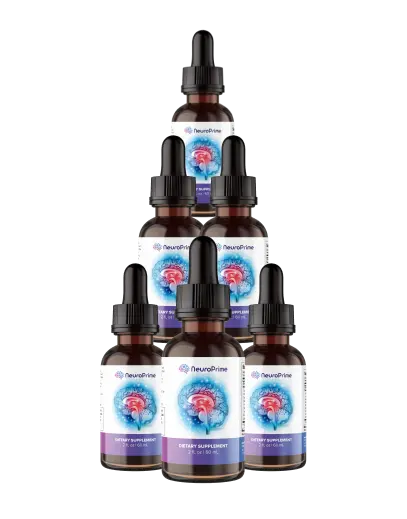

Which means you don’t pay anything for delivery!
And let me emphasize this…
Once you start using NeuroPrime, you don’t really want to stop until your memory is fully restored.
The truth is, we cannot estimate exactly how calcified the pineal gland in your brain is at this moment.
This depends on many factors, such as how long you’ve had memory issues, your medical history, your overall health, and lifestyle choices etc.
Even though you can expect improvements in memory and cognitive functions within a few days…
It could still take more than 176 days to fully decalcify the pineal gland and eliminate all the toxic fluoride from your body.
That’s why when you get the 6-bottle package, you save even more money and make sure you return back to normal.
According to our research, we’ve seen the best results happen when people take NeuroPrime for as long as they can.
That’s why Doctor X. recommends you get the 6-bottle option because you can get an even bigger discount and don’t risk running out of stock.
Like I said, our goal is to help as many people suffering from memory loss as possible.


Which is why I’m willing to take all the risk and give you our 365-day - 100% get rid of cognitive decline or don’t pay - Money Back Guarantee.
That means at any point within the next 12 months you don’t see significant improvements in your cognitive functions… your energy levels rising, and your memory getting sharper…
You’ll get a full refund. NO questions asked.
All you need to do is contact us within the next full year from your purchase.
It doesn’t matter if you used up the entire bottle, we will still give you your money back.
This means you have 365 days to decide if NeuroPrime is for you or not.
All you need is to take a few drops twice per day either in the morning or before sleeping and you'll start feeling better almost immediately…
However it would be a shame to be on your way to completely heal your entire brain…
Just to notice you’re out of NeuroPrime…

Because here’s the thing: Missing even one day of NeuroPrime can set you back in your progress, allowing calcification in your pineal gland to creep back.
And I don’t want you to have to wait months for a new batch of this rare blend to be available again…
And when it finally is, you might find out that the price has doubled or tripled.

The first guide is called: "The Ultimate Brain-Boosting Recipe Book: Use These Science-Backed Ingredients to Enhance Memory and Focus".
Dr. X mentioned that our brain heath is deeply interconnected with our nutrition, especially when it comes to enhancing mental power.

And with NeuroPrime, you're going to be flushing out the toxins from your brain and being on your way to experiencing mental clarity and laser focus.
So essentially, you're already taking a huge step towards improving your cognitive function today…
But we thought, "How could we take it up a notch?"
Especially since we have access to top nutritionists who are experts on brain health.
So we put together "The Ultimate Brain-Boosting Recipe Book"...
And in addition to the brain-boosting ingredients you probably already have in your kitchen...
You'll also discover:
You'll find all that and more inside this guide. And it’s yours FREE when you order the discounted six-month supply.


The second bonus I’ll be sending to you today is truly revolutionary…
Inside this audio program, you'll find a comprehensive guide to significantly boosting your memory using the power of sound waves...

It includes:
Both guides are yours FREE when you order the money-saving 6-bottle package, and you'll get access to them immediately.
Please take into account that NeuroPrime is selling incredibly fast and, once it is sold out...
It will take me 7 to 10 months to produce a new batch
And with rising demand, according to our estimations, NeuroPrime will soon be out of stock.
Because of rising transportation costs, I can’t guarantee the price will stay this low.
And I don’t want you to pay more later.
Think about it…right as you’re reading this report.
Thousands of people all over the world are rediscovering what it is like to have a sharp mind and enjoy peace of mind every single day, confident that their brain health is protected well into old age.
So, no wonder they keep on ordering more every time they finish their supply.
That's why, while NeuroPrime is still available, I urge you not to wait if you're still on the fence.
How does that sound? Take a look below.


All you have to do is click it.
Hit that button and realize - that click is the only thing standing between you and restoring your cognitive health and peace of mind.
Hit that button and realize - that click is the only thing standing between you and experiencing the mental clarity and the peace of mind that you’ve been craving.
Hit that button and realize - that click is the only thing standing between restoring your memory and regaining your life back…
Hit that button and Get Rid of Your Memory Issues For Good.







$594 $234







Just fill in your usual details.
Immediately after you fill in your information and confirm your order, your supply of NeuroPrime will be shipped the same day right to your doorstep.
When you order the 6 bottle package you’ll also take advantage of a huge discount and FREE SHIPPING.
Just click below to select your package: Your order today is a one-time payment with no subscription or hidden charges.

If you see NeuroPrime on any other site other than this one, know it is fake and you buy it at your own risk.
I’ve didn’t want to bring up the bad news, but I've already received threats from the leading companies in the brain health sector
If I ever feel like I am risking my family’s safety, I will close this entire operation.
So please don’t let this opportunity pass you by today while it’s still available.







$594 $234







Keep living with that constant forgetfulness shadowing you, making each day a struggle.
Continue fearing further decline, severe memory loss, and psychological issues, feeling isolated from those you love.
Continue feeling frustrated as nothing seems to work, battling that relentless fog that makes focusing or relaxing impossible.
All while letting this condition steal your memories and your ability to enjoy life's simple pleasures.

You'll be surprised at how well it works, how clear your mind can be and how easily you can think again.
You'll protect your brain well into old age and feel like you've traveled back in time to your 20s and 30s.
So just click below to make your choice, enter your usual details on our secure order form, and place the order now.
We'll immediately ship your bottles directly to your home.
Remember every 6-bottle package comes with a deep discount and two bonuses worth $114, plus FREE SHIPPING no matter where you live.
Plus you get a 365-days 100% you get rid of your memory issues or you don’t pay -Money Back Guarantee…







$594 $234






Look, this isn’t complicated… We all buy things… Some of those things make our lives better in the short term...but not in the long term… This is going to make your life that much better right away.
And…I’m not asking you to buy anything here… All I’m asking you to do… is TRY I’m not asking you to say yes… I’m asking you to say MAYBE... Just say MAYBE for 365- days… that’s a whole year to decide.
Use everything I just showed you to address the real cause of memory loss and say goodbye to memory issues once and for all…
And if you don’t - then you don’t pay.
Everything you’ve seen today probably goes against what you’ve heard from your doctors…
But let me ask you this…


Listen, it’s up to you...
A month from today, you can be nothing more than 30 days older, or you can sleep well at night knowing that your brain is in optimal shape with your memory issues gone and will never come back.
You decide.

John Lennon once said…“life passes you by while you’re busy planning.” Don’t let life pass you while you risk losing your memories, yourself and your loved ones.
Because with NeuroPrime - you no longer have a problem.
Now, you have a solution…

Or you can take what I’ve shared and give NeuroPrime a shot to flush out the gunk from your pineal gland.
No more living feeling like you’re going crazy.
You’ll finally enjoy peace of mind and you’ll give your brain a fresh start before any serious conditions rob your of your cherished memories.
You’ve got nothing to lose and so much to gain!
But I can't make this decision for you… All I can do is show you the way... The choice is yours and yours to make.
One day you will look back on it and realize that … This very moment was the moment that changed everything for you.
So right now is your chance to get your hands on 6 bottles of NeuroPrime before we run out of stock.
Peace of mind is waiting for you on the other side of that button.
And just so you know, you’re not risking anything here…

All the risk is on me… Because remember - if you’re not happy for any reason whatsoever… or no reason at all.
At any point in the next 365 days, just let us know, and we’ll personally see to it you are fully refunded every single penny - no questions asked.
Think about it - If I'm wrong, you're out a few minutes of your time, and a quick email to cancel.







$594 $234






Well, I want you to ask yourself...
Who do you want to be?
The one who keeps living in fear, worrying that something worse is around the corner and could steal your sanity?
Or are you going to take charge and live free from those nagging memory problems?
Do you want to wake up each day feeling anxious and depressed risking everything being taken away from you?
Or do you want to wake up full of joy, feeling sharp and happy?
Your choice.


There are doubts that come along with anything great you’ll ever do... But at some point...the logic has to kick in... Your sanity and quality of life could be increasing…
All while your worries finally end.
You risk nothing here and stand to gain everything.
So the real question is... How can you be smart...and NOT do this?
You've already tried everything to regain your memory.
Don’t make another mistake by not escaping it while you still have the chance.
You're making this decision now…not only for today but for the rest of your life... From now on....every time you wake up.
You’ll think back to this report…
Or will you be enjoying the life you always wanted, all because of the decision you made right now, while you STILL have the chance?
I ask you... If you don't do it now, when it’s this easy… When will you do it?
Now’s the time.

Hit that button below... And let’s give YOU back your mind.
Let’s make you feel completely NORMAL again.
Take your first steps towards flushing our the toxic from your body and fortifying your memory for good.
Click that button below…
Remember it’s completely risk free I’m not asking you to do anything... I’m just asking you to try.
If you don’t find yourself free from those “senior moments” in the next 365 days… You don’t pay.







$594 $234







”Where are those doubts coming from?”
Are you worried this won’t work? I assure you it does.
My wife and the 89,430 people using NeuroPrime are living proof.
You’ve seen the studies… You’ve seen it work for Linda, You’ve seen it work for others… You know it will work for you.
The button you see below... It’s not just a button... it’s your way to taking control back over your mind, over your entire life.
It’s you living a future free of memory problems.
Look, it’s not your fault you never knew about this truth…
But now that you know what to do about it.
It WILL be your fault if you don’t get yourself out of this mental prison.
Hit the button Do it now. Or forever wish you did. Hit the button below.
And since you’ve made it this far I will have a special surprise waiting for you on the other side that I can’t publicly talk about here.
Something that I have only shared previously with friends & family…
Something you will have to see to believe.
Order your supply now and I’ll see you on the other side where I’ll show it to you.








$594 $234






I know we covered a lot of new information today…
So for the next few moments, I’m going to address the most common questions about NeuroPrime to help make the decision to stock up and save on our limited supply very easy.
Answer: NeuroPrime is packed with rare yet completely ingredients that flush out toxic fluoride from your pineal gland and rejuvenate it. Your pineal gland produces melatonin, crucial for sharp memory and reversing memory loss. As we age, it gets calcified due to toxins, reducing melatonin and leading to memory loss. NeuroPrime decalcifies the gland, restoring melatonin and boosting memory and focus.
Answer: Anyone concerned about brain health and memory should consider it. Over 200 million Americans are exposed to fluoride, leading to memory issues. If you're forgetting names, losing items, or feeling foggy, NeuroPrime is for you. It’s also great for maintaining sharp memory as you age.
Answer: If you’re in the US, you’ll receive NeuroPrime in 5-7 business days. If you’re outside the US, delivery times may vary depending on where you live.
Answer: Yes! NeuroPrime comes with a 365-day money-back guarantee. Try it for up to a year, and if you’re not happy, just call us or send us an email and we’ll give you a full refund. It’s completely risk-free.
Answer: That’s hard to say. The brain industry isn't thrilled with our breakthrough, and supply issues make ingredients hard to get. It’s best to order now while you can, especially with our 365-day guarantee. Stock up to ensure you don’t miss out.
Answer: Great! Click the button below, choose your package, and complete your order. You’ll get NeuroPrime in 5-7 days. Start using it, and let us know how it changes your life.
Thanks for sticking with me till the end. Go ahead, make your choice now.







$594 $234





